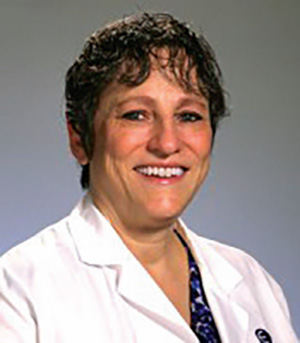
Barbara Schreibman, MD, FACEP, associate chief of emergency medicine and medical director of EMS, has been an ER doctor at Englewood Hospital and Medical Center for over 25 years. Here she offers tips and insights into emergency medicine.
- What do you find most rewarding about emergency medicine?
I love coming to work every day. We are helping people when they are most vulnerable. I get to be with people at times of crisis and reassure them we will do everything we can to make them feel better. I couldn’t imagine doing anything else.
- Where did it all start?
I wanted to be a doctor from the time I was 11 years old. When I was 14, I started volunteering at a hospital. We lived in Brooklyn and I took two buses to get there. I loved being around sick people and helping them.
- How has the field changed over the years?
There have been a lot of advancements in medical care, for example in stroke and heart attack.
Years ago, when patients arrived in the ED having a stroke, there wasn’t much doctors could do but admit them for observation, and then have them start rehabilitation. Now we have medications and surgical procedures that can actually get rid of the clot causing the stroke. For example, TPA is a medication that can dissolve a clot, and there are surgical procedures that can pull out the clot.
In the past, heart attack patients were given morphine (for pain) and then admitted to the hospital. Now, paramedics can diagnose a heart attack at the scene and administer aspirin or nitro for treatment right away. The paramedics communicate with the emergency department and actually transmit the EKG to the team while the patient is en route. Englewood Hospital’s cardiac catheterization team will then be waiting for them at the hospital to quickly open the blocked artery.
- What Tips Can You Offer the Community?
When you come to the ED, come prepared. Bring a list of your allergies and medications—including dosages, the name of your physician and any important medical records, such as a previous EKG. Today, people use their cell phones to capture this information, taking photos of medication labels or physician business cards. Then they can just show us the pictures. Do this for yourself, your spouse, your relatives etc. It can be very helpful.
Assess the situation. It’s always better to be safe than sorry in an emergency situation, but think about the best place for you to go and how you should get there. If you’re experiencing stroke or heart attack symptoms, shortness of breath, trauma, seizure, head injury, vomiting blood, acute confusion, or severe pain or injury, it’s best to call an ambulance so EMS can begin treatment on your way to the hospital. Urgent care centers can treat older children or adults without chronic medical problems for non-complex issues such as an earache, sore throat, cough and cold, superficial lacerations, mild injuries, rash, sinus pain and toothache.
Take a CPR course. I encourage everyone to learn some basic lifesaving skills—you never know when you may need them. Englewood Hospital’s EMS division offers CPR courses for the community. For information about classes, call 201-894-3875.
Take precautions. Get your body warmed up for summer activity, wear appropriate attire, apply sunscreen regularly and remember to rest and hydrate. Especially when traveling overseas, be conscious of any new symptoms.
- What do you like most about your job?
Englewood Hospital recognizes that the emergency department is the door to the community. We feel very supported by hospital administration, fellow doctors and the board of trustees. As a result, our team is able to advocate for our patients. This year at the hospital gala (Saturday evening, June 9), the ER doctors are being honored.
- What do you do in your free time?
I became an EMT when I was in college and rode with the ambulance squad there. Today, I am medical director for several local volunteer ambulance corps. Additionally, I am an evaluator for the Commission on Accreditation of Ambulance Services, where I visit EMS systems and teams throughout the country, offering recommendations and bringing best practices back to Bergen County.
Additionally, I love to travel with my family. Last year, we went to Morocco. People were very welcoming to Americans and Jews. We had a marvelous time.
By Barbara Schreibman, MD, FACEP
Barbara Schreibman, MD, FACEP, is board certified in emergency medicine. She is associate chief of the department of emergency medicine and medical director of Emergency Medical Services at Englewood Hospital and Medical Center, in Englewood.








